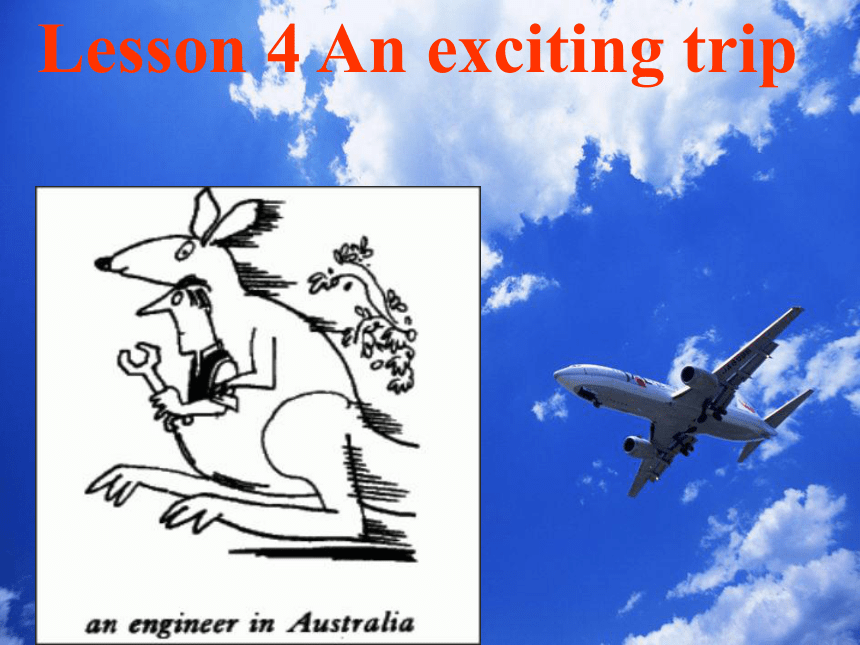(
课件网) Lesson 4 An exciting trip Australia National flag National Emblem Canberra (capital ) Sydney Famous cities koala Kangaroo Sydney Opera House Questions: 1. How long has Tim been in Australia He has been there for 6 months. 2. What does he do in Australia He was working for a big firm as an engineer. 3. Why is Tim finding this trip exciting Because he has never been abroad before. True or false I have just received a letter from my sister, Tim. I have just received a letter from my brother, Tim. 2. He has been there for three months. He has been there for six months. 3. Tim is a mechanic. He is working for a small firm. Tim is an engineer. He is working for a big firm. 4. He has already visited a great number of different places in Australia. True. True or false 5. He has just bought an American car . He has just bought an Australian car. 6. He has gone to Alice Springs , a small town in the south of Australia. He has gone to Alice Springs , a small town in the centre of Australia. 7. He will soon visit Perth, and then fly to Darwin. He will soon visit Darwin, and then fly to Perth. 8. My brother has never been abroad there, so he is finding this trip very exciting. True. I have just received a letter from my brother, Tim. receive:收到,接到. accept:接受. 我收到一份来自陌生人的礼物,但是我没有接受它。 I received a present from a stranger, but I didn’t accept it. He is in Australia. He has been there for six months. Tim is an engineer. He is working for a big firm and he has already visited a great number of different places in Australia. firm: company. a great number of + countable nouns a great number of = a great many a great amount of+ uncountable nouns a great amount of money He has just bought an Australian car and has gone to Alice Springs, a small town in the centre of Australia. centre: n. middle She lives in the centre of the city. central: adj. a city in central Europe He will soon visit Darwin. From there, he will fly to Perth. My brother has never been abroad before, so he is finding this trip very exciting. have been to someplace Have you ever been to Hong Kong Have you ever been there have gone to someplace He has gone to Hong Kong. He has been to Hong Kong. 1 “have/has gone to 2 have/has been to 3 Have/has been in (一)三者之间的区别: 1.表示某人已去某地了,不在现场,。(现在在去某地的路上,正在某地,或者在归途中) 2. 表示某人去过某地.(现在人已不在某地了)。 3. 强调某人在某地呆过或呆了一段时间。 (二)三者的常见用法: have/has gone to+地点 have/has been to+地点+次数 have/has been in+地点 (三)三者的相同点: 当后面跟地点副词(e.g. there)时,介词to 、in 要省略。 go to England Jim _____ _____ _____ England, he will come back next week. Jim _____ _____ _____ England many times, he will go there next week again. England China has gone to has been to 1. I _____ Tibet several times. I like it very much. A. have gone to B. have been in C. have been to 2. --Where is Jim -- He ... ...

